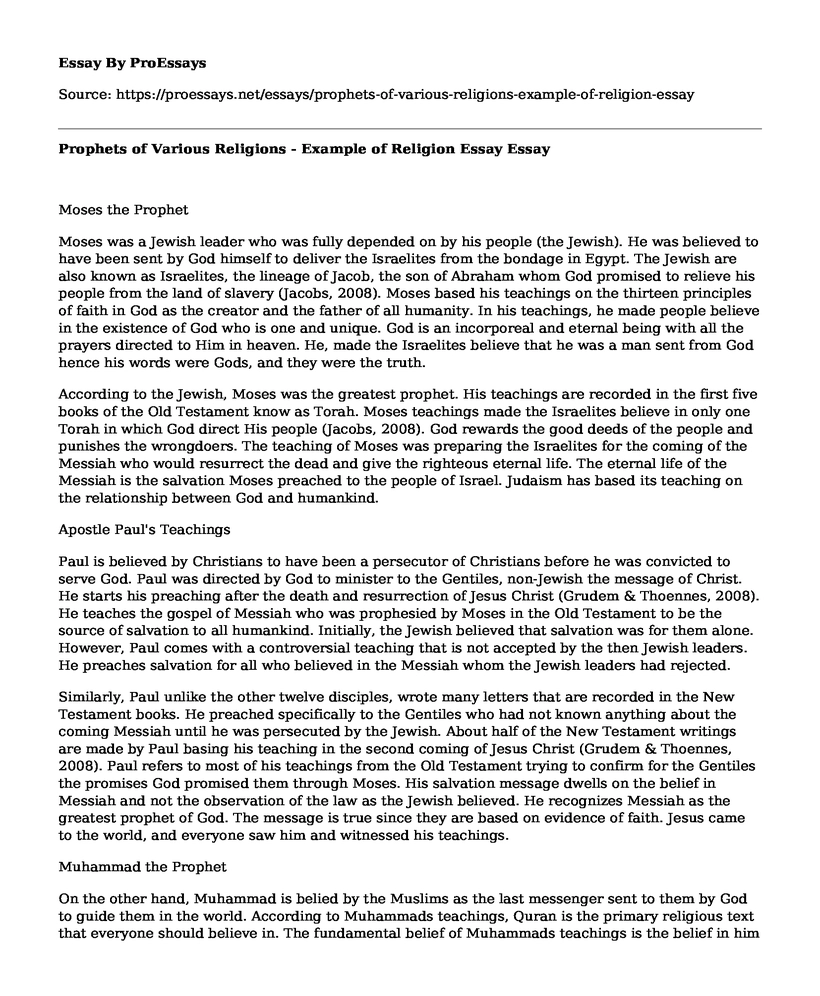Moses the Prophet
Moses was a Jewish leader who was fully depended on by his people (the Jewish). He was believed to have been sent by God himself to deliver the Israelites from the bondage in Egypt. The Jewish are also known as Israelites, the lineage of Jacob, the son of Abraham whom God promised to relieve his people from the land of slavery (Jacobs, 2008). Moses based his teachings on the thirteen principles of faith in God as the creator and the father of all humanity. In his teachings, he made people believe in the existence of God who is one and unique. God is an incorporeal and eternal being with all the prayers directed to Him in heaven. He, made the Israelites believe that he was a man sent from God hence his words were Gods, and they were the truth.
According to the Jewish, Moses was the greatest prophet. His teachings are recorded in the first five books of the Old Testament know as Torah. Moses teachings made the Israelites believe in only one Torah in which God direct His people (Jacobs, 2008). God rewards the good deeds of the people and punishes the wrongdoers. The teaching of Moses was preparing the Israelites for the coming of the Messiah who would resurrect the dead and give the righteous eternal life. The eternal life of the Messiah is the salvation Moses preached to the people of Israel. Judaism has based its teaching on the relationship between God and humankind.
Apostle Paul's Teachings
Paul is believed by Christians to have been a persecutor of Christians before he was convicted to serve God. Paul was directed by God to minister to the Gentiles, non-Jewish the message of Christ. He starts his preaching after the death and resurrection of Jesus Christ (Grudem & Thoennes, 2008). He teaches the gospel of Messiah who was prophesied by Moses in the Old Testament to be the source of salvation to all humankind. Initially, the Jewish believed that salvation was for them alone. However, Paul comes with a controversial teaching that is not accepted by the then Jewish leaders. He preaches salvation for all who believed in the Messiah whom the Jewish leaders had rejected.
Similarly, Paul unlike the other twelve disciples, wrote many letters that are recorded in the New Testament books. He preached specifically to the Gentiles who had not known anything about the coming Messiah until he was persecuted by the Jewish. About half of the New Testament writings are made by Paul basing his teaching in the second coming of Jesus Christ (Grudem & Thoennes, 2008). Paul refers to most of his teachings from the Old Testament trying to confirm for the Gentiles the promises God promised them through Moses. His salvation message dwells on the belief in Messiah and not the observation of the law as the Jewish believed. He recognizes Messiah as the greatest prophet of God. The message is true since they are based on evidence of faith. Jesus came to the world, and everyone saw him and witnessed his teachings.
Muhammad the Prophet
On the other hand, Muhammad is belied by the Muslims as the last messenger sent to them by God to guide them in the world. According to Muhammads teachings, Quran is the primary religious text that everyone should believe in. The fundamental belief of Muhammads teachings is the belief in him as the only true messenger from God and not Jesus Christ (Fadel, 2010). He believed in one God who had power over all creatures both on earth and in heaven. Muslims believe in salvation by God through his messenger, Muhammad the prophet. Even though the Muslims believe that Muhammad was the restoration of the lost, he contradicts the teaching when he sketched out a constitution for the Medina and specific communities (Fadel, 2010).
Finally, Muhammad's teachings are only limited to the Muslims unlike the gospel of Paul that is preached for all (Fadel, 2010). His teaching is only confined to the Arab countries where he lived. He also claimed to have been sent from God yet teach contrary to the original message of God. He believed that Jesus existed but does not recognize him as a Messiah but just refer to him as Isa.
Reference
Fadel, M. (2010). 'No Salvation Outside Islam': Muslim Modernists, Democratic Politics, and Islamic Theological Exclusivism. Available at SSRN 1712972.
Grudem, W. A., & Thoennes, K. E. (2008). Systematic theology. Inter-Varsity.
Jacobs, L. (2008). Principles of the Jewish faith: an analytical study. Wipf and Stock Publishers.
Cite this page
Prophets of Various Religions - Example of Religion Essay. (2021, Mar 23). Retrieved from https://proessays.net/essays/prophets-of-various-religions-example-of-religion-essay
If you are the original author of this essay and no longer wish to have it published on the ProEssays website, please click below to request its removal:
- Experience in Saint Demetrios Greek Orthodox Church Essay
- Generational Differences in Levels of Control Held Among Family Businesses Approaching System
- Epidemic of Mental Health Issues in Youths of Affluent Families Paper Example
- Organization of Buddhism Structures and Sects Essay
- Image of Islam and Muslim in the West Paper Example
- The Extent to which Family Law Recognizes Children's Rights - Essay Sample
- Essay Example on God: Unchanging, Everywhere, Personified, Righteous, & Holy







